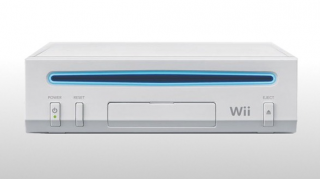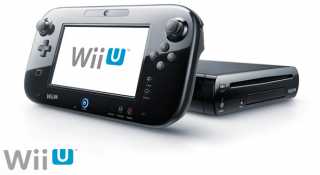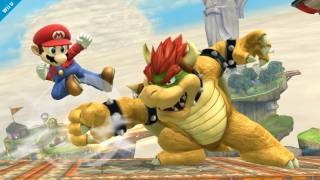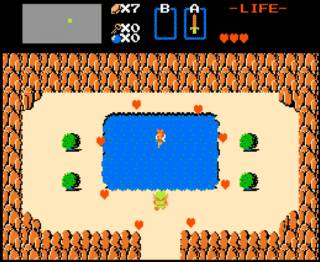Nintenthoughts
By gamer_152 31 Comments
I'm still not sure how I felt about Nintendo forgoing an E3 press conference this year, in favour of a special Nintendo Direct broadcast, but in many ways it seemed reflective of company’s position in relation to the other console manufacturers. You still occasionally see people criticising Nintendo’s console for its inferior hardware or lack of online support, but we’ve known for a long time that Nintendo are playing a very different game from Microsoft and Sony. In a way it makes sense for games enthusiasts.

We already have two competitors in the market giving us higher end hardware, it seems advantageous to have an alternative competitor that is providing us with systems that are cheaper and using technology in unconventional ways. We already have two competitors providing us with lots of online multiplayer and media streaming via our consoles, it makes sense to have someone else who places greater focus on local multiplayer and connecting with people around us in other ways. At least, this looks good on paper. We’re not exactly buried in quality third-party games on Nintendo’s consoles, and inventive applications of technologies like the Wiimote or the Wii U touch pad seem few and far between. This pattern goes back to early on in the Wii’s history, where despite innovation supposedly being a cornerstone of system, it became somewhat infamous for its particular brand of “shovelware”; a collection of low budget, low quality, motion controlled-based games for the casual gaming crowd, that were often rehashing the same gameplay concepts over and over.
Project Revolution
It’s easy for us to conflate our personal opinion on these games with the opinion of the wider public, perhaps the casual crowd on the whole enjoyed these releases, but there was something a little uncomfortable about them. Not only was seeing so many drab and unimaginative titles disappointing for gamers who owned a Wii, but the primary purpose of the Wii was to welcome new people to gaming, and give those who’d never otherwise pick up a controller, a little piece of the enjoyment that this entertainment medium has brought us over the years. However reasonably or unreasonably founded it was, there was this troubling idea that many third-party companies were using the casual crowd’s limited knowledge of video games, and unfamiliarity with the industry, to exploit them into handing over money for games that weren’t that concerned about the enjoyment of the player. While I am being rather speculative here, it could be theorised that this impeded the Wii’s ability to welcome in a new gaming audience, and meant that for some players, video games were just going to be an amusing new fad until they got bored of the third-party studios’ endless mini-game collections and cheap licensed products.
Whatever the case with the shovelware, it also felt like motion control games in general didn’t progress far beyond the tech demo-style early releases. Some combination of business and game design issues came together to mean that a lot of the gameplay experiences revolving around arguably the most fundamental feature of the Wii, were shallow and derivative. Even now it remains unclear where exactly motion control games go next. The Wii was rich with first-party titles, but its lower end hardware meant it wasn’t getting the same kind of high quality third-party games we were seeing on the 360 and PS3, and the games it was getting weren’t particularly innovative. It seemed unfortunately like it was far too easy for the same thing to happen to the Wii U, and it kind of has.
Tablet Trouble

Where supported, being able to pull your games off of the television to play them on a tablet is a practical and useful feature for many, but there are almost no developers choosing to do something different with the Wii U’s unique controller, and in gameplay terms, it has largely just become an expensive inventory and map display system. I’d be very surprised if we see many games utilising it in a way that doesn’t just feel like more tech demos. This time round Nintendo had a potential opportunity for a different kind of leg-up on the competition though. Launching long before the other consoles of the next generation, they had a limited window in which their hardware was on the same level as Microsoft and Sony’s current consoles, in theory allowing them to release more popular cross-platform games on their system.
Either they have decided that still isn’t their strategy and have deliberately refrained from picking up a lot of those games, or they’re just unable to get the games they want. Maybe it’s a combination of the two. The Wii U library now includes Watch_Dogs, Deus Ex: Human Revolution, Batman: Arkham City, and so on, but some of those bigger titles are coming out, or have come out, a significant amount of time after they’ve already been released on other consoles, and the Wii U is still far from the third-party powerhouses of the 360 and PS3. When Nintendo get a big third-party game the reaction seems to be a slightly depressing “That’s pretty good for Nintendo”.
Even the first-party games that have been a large part of the draw of Nintendo’s past few systems have been largely absent from the Wii U, and as many have identified, this has no doubt contributed to the poor sales of the machine. There’s been no 3D Mario, no Legend of Zelda, no Super Smash Bros., no Metroid, no Mario Kart, and none of the other games people expect. The absence of a casual gaming crowd on the scale we saw for the original Wii also left Nintendo in an interesting position for E3 2013. It was predictable that they were going to make announcements to fill those gaps in their first-party line-up and keep the same franchises going that they have been for years now, but what about the casual market on which their previous success hinged so strongly?

The casual games offering at this year’s E3 seemed to be a new Wii Party and a new Wii Fit, suggesting that Nintendo believe that these, along with the announced titles from their classic franchises, will be enough to win back as many casual fans as they’re going to get, or that they’re just not as invested in building as large a casual base as they used to be. For people who love Nintendo it looks like some of those much-loved first-party titles are finally coming, with a 3D Mario, Donkey Kong, Pikmin, Super Smash Bros., Yoshi game, and Zelda: Wind Waker remake on their way, but many of these games are going to hit more than a year after launch, and I still worry about whether an entire console can be kept afloat by a bulk of first-party titles and a smattering of third-party gems. The 3DS is still getting by pretty well, and maybe the Wii U will become greatly profitable, but sometimes I'm anxious for Nintendo in the long-term.
The Nostalgia Machine
On a more personal level I’ve grown a bit estranged from them, partly because, like many others, I feel I’ve already played everything Nintendo has to offer. There’s a startling degree of polish to their games, and an unmistakable charm and nostalgia in a lot of what they produce, but it feels like there’s so much talent locked up in that studio that’s wasted remaking the same few games until the end of time. I think that’s why in recent years, I’ve been more interested in Nintendo’s returns to less well-explored franchises like Luigi’s Mansion and Pikmin, than I have been in a new Mario Kart or Zelda. Some would call Nintendo’s continual iteration on their popular titles them staying true to their roots, but in my mind it’s the opposite.
Franchises like Mario and Zelda exist in the first place because Nintendo were eager to use their child-like creativity to birth games that were original and different. As the years have rolled on it seems that in some ways they’ve turned into a very different company, and that the drive or philosophy that originally spawned these great game series has withered. The NES era was their real creative renaissance, bringing with it Mario, Zelda, Metroid, Earthbound, Kirby, Advance Wars, Fire Emblem, F-Zero, and more. The SNES era wasn’t as ground-breaking, but we still saw new games like Pokemon, Donkey Kong Country, Mario Kart, and Star Fox. Creativity seemed to recede further with the N64, but the console played home to new 3D interpretations of their big titles, with such well-remembered games as Mario 64, Zelda: Ocarina of Time, Mario Party, and Super Smash Bros. Inventive reimaginings were wearing thin by the time of the Gamecube, but it kicked off Metroid Prime, Animal Crossing, and Pikmin, and Warioware came out on the Gameboy Advance in the same generation.

How many new game ideas did Nintendo’s developers have in the Wii era that didn’t seem like they were just aimed at casual gamers? How many games for the Wii U feel like they’re genuinely something new at all? Breaking down Nintendo’s history and looking back, I think it becomes clear just how dry the creativity well has become. Even focusing on new games in their existing franchises, they seem to be less and less ambitious with the new ideas they have for series like Mario and Zelda. This is a shame, because part of the wonder of these games to begin with, was in the discovery of these fantastic new worlds Nintendo were laying out before us.
We Would Like to Play
Don’t get me wrong, in an ideal scenario, with all the disposable income, I’d probably buy more Nintendo games and play a good chunk of them, and I still enjoy dipping into a Pokemon here and an Animal Crossing there. But I see Nintendo taking an approach to their games which is upsetting. They’re fostering a combination of repetitive first-party games, and third-party games that neither match up to the AAA releases of the other consoles, nor use Nintendo’s hardware in an interesting fashion.
I think there are people who because they don’t like what Nintendo is doing, think Nintendo will fail, or downright want them to. I think there have been people who have judged far too quickly that they definitely know the fate of the Wii U and who it does or does not appeal to. I don’t want to be one of those people. As I said, Nintendo can provide us a potentially worthwhile alternative to the other companies, competition is always important in the console market, there’s still something great about the games they make, and I can’t really predict the future of their consoles. The criticism I aim at Nintendo is not because I don’t like them, but because I want to see them play host to the best games they can. There’s also something endearing about the way Nintendo appears alongside their competition.
Maybe the reality is that Nintendo games exist the way they do because of the cold, calculated decisions of a bunch of businessmen, but they’re in some ways the underdog of the console industry. I love the work that’s done by Sony and Microsoft, but on occasion it feels like you’ve got a software manufacturer on one side, an electronics manufacturer on the other side, and Nintendo are just this humble group of ex-toymakers who want to create games that can make people smile and bring friends together. I hope that’s something those guys keep getting to do for a long time to come, even if they might never be quite the franchise creators they once were. Thanks for reading.